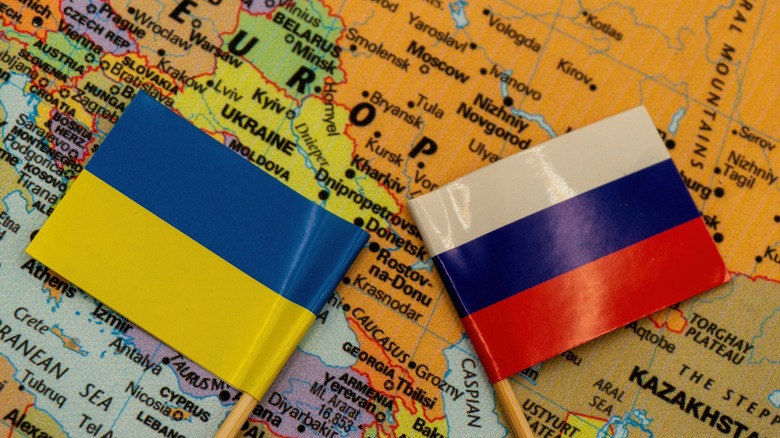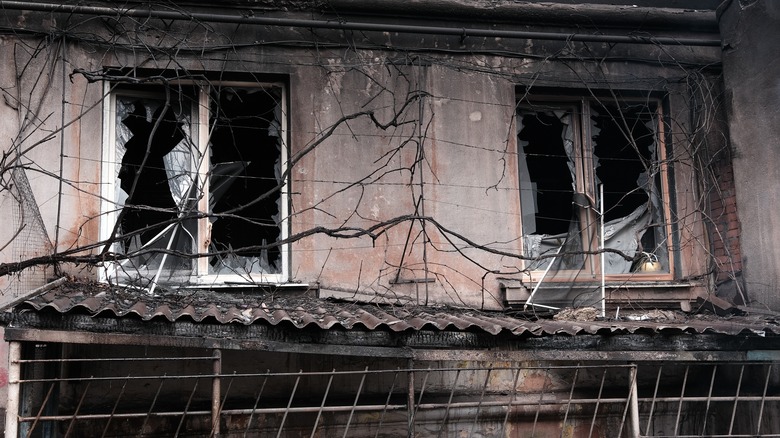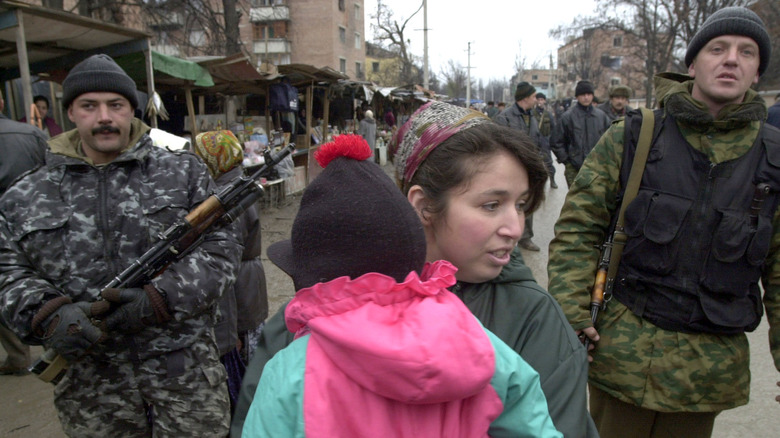What Is A Filtration Camp?
It's alleged that Ukrainian civilians who have been forcibly removed from their home country during Russia's war on Ukraine have been taken by busloads to "filtration camps," according to Yahoo! News. Brought into the camps for interrogation, the Ukrainian civilians are reportedly interrogated for hours at a time, fingerprinted, photographed, and forced to turn in their identification papers and cell phones. Afterwards they are sent to cities in Russia. According to Ukrainian officials, more than 40,000 have been forcibly removed from Ukraine and sent to Russia since the beginning of the invasion.
One woman who survived the experience spoke to The Guardian from Roskov, Russia, on the condition that she remain anonymous for the safety of her family in Ukraine. She said Russian soldiers took her from a bomb shelter in Mariupuol, along with other women and children. She was transported with about 200 to 300 people by bus, arriving at a filtration camp on the border of Russia, where she underwent questioning. "They went through my phone: they asked if I knew anything about the Ukrainian army, if I had friends in the military," the woman said. "They also asked me what I thought about Ukraine, about Putin and about the conflict. It was very degrading."
'It was not a choice'
The anonymous Ukrainian woman told The Guardian that the filtration camp was simply a collection of military tents. The screening took a couple of hours. After that, having had their identification documents and cell phones confiscated, the Ukrainian civilians were transported to Russia. "It was not a choice," the woman said. "People need to know the truth, that Ukrainians are being moved to Russia, the country that is occupying us."
Russian officials deny such accounts. According to Yahoo! News, Kremlin spokesperson Dmitry Peskov denied that Russian soldiers forcibly removed Ukrainian citizens. He claimed that Ukrainians fled to Russia voluntarily to escape violence following the Russian invasion. Ukrainian officials say otherwise. According to a Telegram post from Mariupol City Council (translated in Yahoo! News), Russian soldiers have kidnapped Ukrainian civilians from that city. It is a war crime under the Geneva Conventions (posted by the International Committee of the Red Cross) to remove people from their home country during international conflict, no matter what the motive.
However, the existence of filtration camps is not in dispute. The Rossiyskaya Gazeta, a Russian government-owned newspaper, reported (via The Guardian) that 5,000 Ukrainians had been processed in a filtration camp set up in the village of Bezimenne, and had been screened there to prevent "Ukrainian nationalists from infiltrating Russia disguised as refugees so they could avoid punishment." Satellite images have also confirmed the existence of the filtration camp in Bezimenne, a Russian-controlled Ukrainian village, according to Yahoo! News.
The history of filtration camps
According to Huffpost, filtration camps date back to the end of World War II, when Russia was part of the Soviet Union. The camps were used to screen returning Soviet citizens after the war. At the time, all citizens who had been living outside the Soviet Union, even those who had been prisoners in Nazi Germany, were considered "suspect," so they were screened in makeshift camps before they were allowed re-entry to the country.
Filtration camps were also used during Russia's war against Chechnya, where thousands of Chechens were interrogated in the camps, according to the BBC. The organization Human Rights Watch documented numerous human rights abuses by Russian soldiers, including rape, beatings, and torture of civilians inside the filtration camps in Chechnya in 1999, according to a report issued in 2000 (posted at Human Rights Watch).
Linda Thomas Greenfield, U.S. ambassador to the United Nations, condemned Russia's use of filtration camps in the war against Ukraine, according to Yahoo! News. "Reports indicate that Russian Federal Security agents are confiscating passports and IDs, taking away cellphones, and separating families from one another," she said. "I do not need to spell out what these so-called filtration camps are reminiscent of. It's chilling, and we cannot look away."


